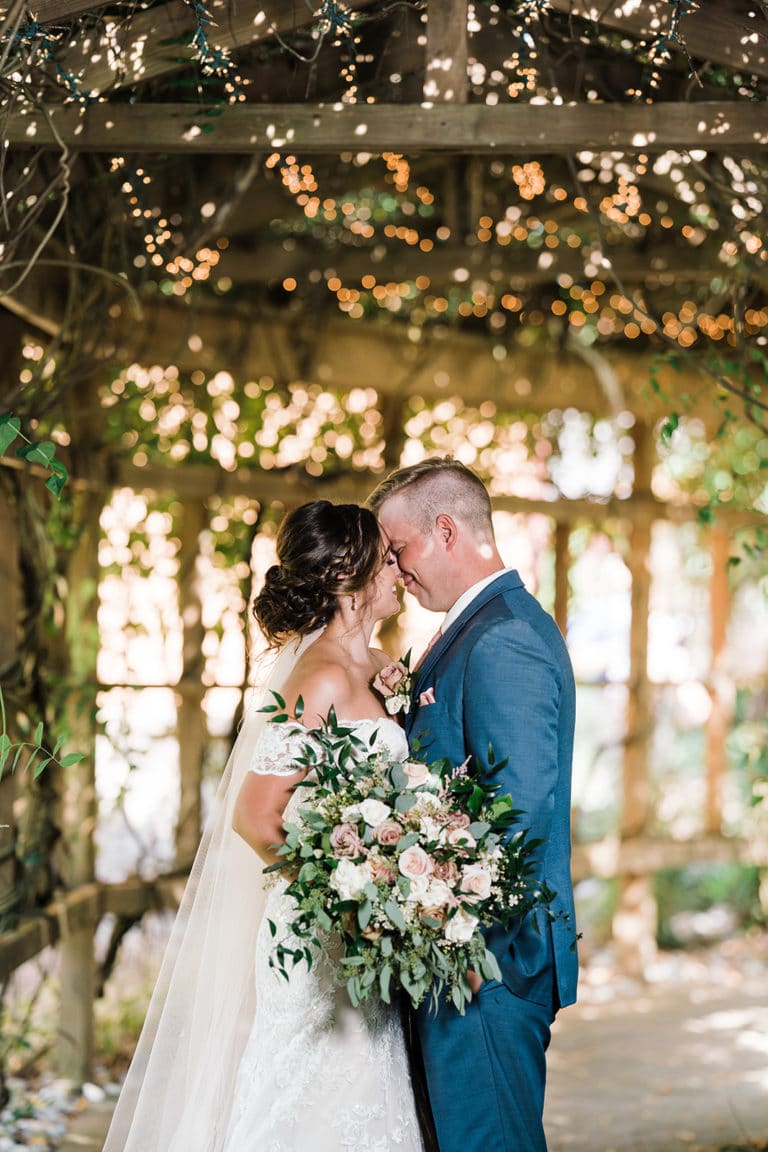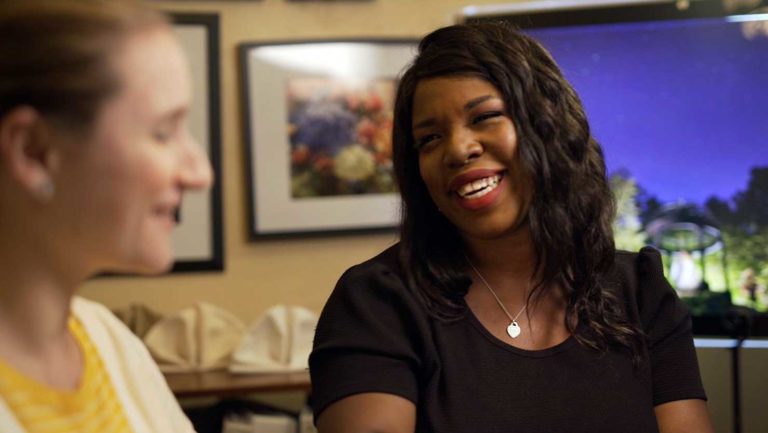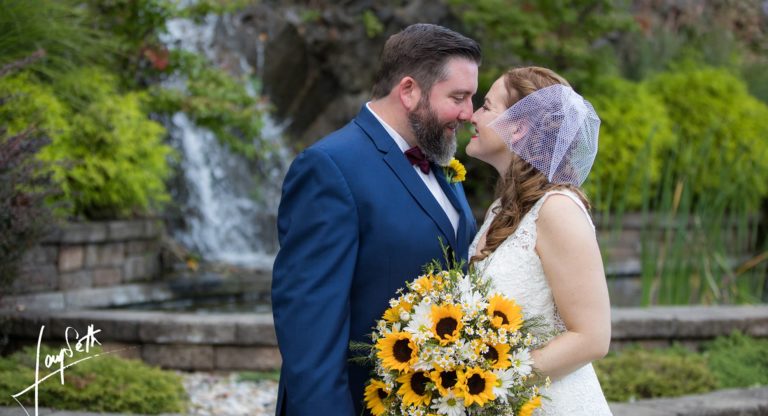The details can be the most stressful or the most enjoyable part of planning.
To ensure less stress and more joy, remember to make a decision, stick to it, and allow your wedding team members to worry about executing the details.
Step 7 – Solidify the Flowers, Favors, and Photo Ops
These three elements will create memories that will last a lifetime, so don’t skimp on any of the above.
- Flowers will take your guests to another place, lead them to a world of beauty, and make hearts sing! The personal flowers you wear or carry should reflect a style befitting the wedding ensembles, including size, shape, and color. The ceremony and reception décor usually take on a personality kindred to the venue and the day’s theme. The ceremony site will dictate the flora, fauna, and décor befitting the altar space. For instance, if the footprint where you will say for vows is a mountain overlook, then minimize the décor and maximize the view. A simple example of a rustic-chic vibe when the reception venue is a restored barn would incorporate natural elements that bring the outside inside. Branches, moss, dried flowers, succulents, leaves, lanterns, grapevine, green garlands, and more will help convey your barn from rustic to chic. Something more avant-garde for a barn wedding would be the use of formal flowers like calla lilies or orchids in hollowed-out log vases. These sophisticated flowers add chic to the log’s rustic appearance working as the yin and yang forces that complement and connect the natural world. Make the final floral and décor selections no less than 6-months before your wedding date to ensure the elements are on reserve and positively affect the pricing.
- Favors, while not a necessary element, can most certainly create a memory and act as a thank you for the favor of the guests’ attendance. The most popular wedding favors are either donations to a cause supported by the couple or edible items as sweet remembrances for the journey home, or a treat for the next morning. Which would you remember – a single personalized wine glass or a loaf of iced raisin bread for breakfast the following day? 95% of your guests will take the bread and leave the empty glass behind.
- Photo ops are critical and should be planned throughout the day and in many locations. A photo timeline should be developed and distributed in advance to all the wedding party members and the immediate family. Taking time to find an uncle or track down an aunt for the family photos takes away from the party time and adds a level of frustration that advance photo planning will avoid. Speak with your planner about a pictorial map before discussing a timeline with your photographer. Your planner knows the venue far better and can suggest the perfect locations to minimize the length of time it takes to capture digital memories. A picture is worth a thousand words but should not take a thousand years to shoot.
Step 8 – Logistics
By definition, logistics is the detailed coordination of a complex operation involving many people, places, and services. We define a wedding similarly, requiring the organized coordination of events, gathering friends, immediate and extended family, and the orchestration of a squad of personnel including chefs, bakers, vendors, and execution staff. Logistics planning is the key to rave reviews. The stages of logistics planning are as follows:
- Seating Floorplan – guests’ seating is the most challenging task of wedding planning, where the host must consider relationships, personalities, and any guests with special needs. The proper seating assignments weigh heavily on the guests’ enjoyment. Pick a seat not a side works for the ceremony, but open seating for the reception often ends in disaster. Seating assignments should begin with the guest list preparation for the invitations. Grouping family households, guests with their plus one together, and clustering tables by association will produce the best results. For example, seat tables of college friends next to each other, by their ages and their collegiate memories of the couple, the friendly conversation will evolve quickly. Assign guests with a guest to tables that share a similar experience with the bride and groom – like attending a specific event together or meeting for the first time at the same pub. Remember never to seat feuding family at the same table – a wedding is not a day to mend fences. Always remember to be respectful of parent seating, especially if there are multiple sets of each. The answer to seating four sets of parents is not to give them separate corners to come out fighting, but rather to speak with them in advance and suggest seating assignments based on their attending guests and other family members. Beginning seating logistics well in advance will create less drama in the final days of preparation. The best-laid floorplan will ensure a commonality amongst the guests at each table, guaranteeing harmony and good conversation throughout the evening.
- Ceremony Programming – programming of the ceremony will depend significantly on the type of celebration. A church wedding will have a standard format followed by the Pastor or Priest. A Hindu ceremony will begin with the Baraat Parade and end some 2.5 hours later. A venue ceremony can be civil with a judge or mayor presiding, spiritual with a minister leading all in prayer, or emotional telling the couple’s love story and their reason for uniting. The fundamental elements of every wedding ceremony include the declaration of intent, the exchange of vows and rings, the affirmation of marriage, the kiss, and the pronouncement of the married couple. Whether an officiate writes words to read and program to follow, or it becomes a collaboration between the celebrant and the couple remains a mystery to guests until the processional begins. The planning will culminate with a rehearsal traditionally the day before the wedding. The event planner will oversee the practice session, ensuring the plan on paper is perfect in person.
- Reception Itinerary – will be filled with the who, what, when, where, and why’s of the wedding execution. This document will be circulated to the event supervisors, front and back of the house staff members. It will be reviewed with vendors and discussed with set-up crews. All in advance of the day, ensuring the day-of-coordination is seamless. An example of the ceremony program and reception itinerary is attached below. Note the document includes timing, professionals, accouterments, general seating, processional to recessional details, special dances, toasting, blessing, cake cutting, and other favorite traditions a couple might choose to include or lose. Itinerary work is completed with your event planner’s help during the last three months of planning and executed with gentle guidance from the event supervisors on the day of the wedding. Remember that the itinerary is not an exact timeline but rather a guideline that can be massaged and adjusted on the fly to guarantee the couple’s vision is clear and present at all times.
- After-party Scheduling – for some, the last dance is the end of the night, but others may think of it as the first drink at the after-party. Extending the wedding day hours has become a popular way to say goodnight or goodbye to guests who have traveled far and wide to be part of the celebration. There are many options for the extended hours of service, which will vary based on the venue itself and its proximity to various activities in the neighboring areas. After-party planning requires an understanding of what guests will participate in, choosing the party’s location wisely, and ensuring the guests’ safety is paramount as they party on into the late hours. Ask the following questions to get the best answers for after-party planning:
- Is the goal to bring the guest list down to an intimate group or to include everyone on the list? If a smaller private gathering is preferred, then take the party to another location, as many will change their minds about staying once they reach their cars. Should the objective be to keep the crowd together, then stay in the wedding venue’s footprint?
- What should guests be served at the after-party? A cash bar is politically correct for the extended hours of the wedding, but the tab or consumption bar option is best for the guest and minimizes the cost for the host. Remember always, food and beverage go together like hand and glove. Never serve alcohol without serving something to eat, as too much liquid courage will quickly invoke the damage clause in the event contract. When choosing food, do not plan another dinner. Think of bar favorites like wings and pizza, go with a dessert display for sweet dreams at the end of the night, or roll out the breakfast buffet and complete the day with morning favorites.
- What is the point of the after-party? The reason for the after-party is to allow guests to catch up with friends and family before leaving, to find a cup of coffee afore a long drive, to seek a designated driver, or reserve a room at the Inn. Safe celebrating will create positive memories of a well-planned wedding. Therefore, take control of your guests’ departure and designate someone to watch over them as they leave.
Step 9 – Execution
Execution begins and ends with the team of professionals and staff assembles by the couple’s wedding planner. The individuals and companies selected by the planner will guarantee the execution of an unforgettable affair. Their ability to create a stress-free environment will be unequaled. The planner’s obsession with detail, courteous, proficient, and friendly manner will safeguard the impeccable quality and gracious hospitality. Therefore, the best advice for executing a dream wedding is to sit back, relax, and let the team who has invested their time and talent into designing your wedding take command of the day. Their gentle guidance will ensure the perfect execution of every unique moment that will make a memory last a lifetime.
Breaking wedding plans into steps can make the daunting task seem simple. These nine necessary steps can put you on the road to enlightenment and worry-free wedding planning. If the basics feel too broad, take the “baby-step” approach and insert an itemized list of tasks that will increase productivity, accountability, and efficiency, assuring greater comfort and happiness.
Taking the Final Step – is next.
Hands Down Unforgettable!
"Words will never be enough to describe the thanks and gratitude I have for the staff at Stroudsmoor Country Inn. They were absolutely wonderful throughout the whole wedding planning process but little did I know how amazing they would be until the pandemic happened.
Three days until our wedding the governor made restrictions that literally made my heart drop. I was completely in tears and though that I would have to cancel with 3 days to go. Stroudsmoor went above and beyond without hesitation. They rearranged things so planning could continue. From the delicious rehearsal dinner down to the gorgeous flowers, our absolutely stunning wedding event would not have been possible for the tireless efforts of Stroudsmoor's Event Planners and Floral Manager. To them, I was not just another bride or check. I was family! It meant a great deal to my husband and me.
On the day of the wedding, Stroudsmoor staff (Sam, Kirstin, and Kelsey) made sure that our day went smoothly. From our glasses were always full, and our guest were happy. Our wedding was more than we ever hoped and dreamed. Something we never thought would be possible during these times. Ryan and I thank from the bottom of our hearts."











